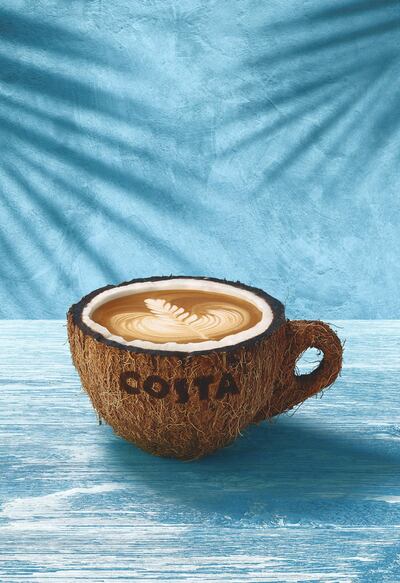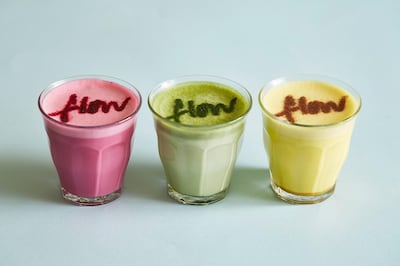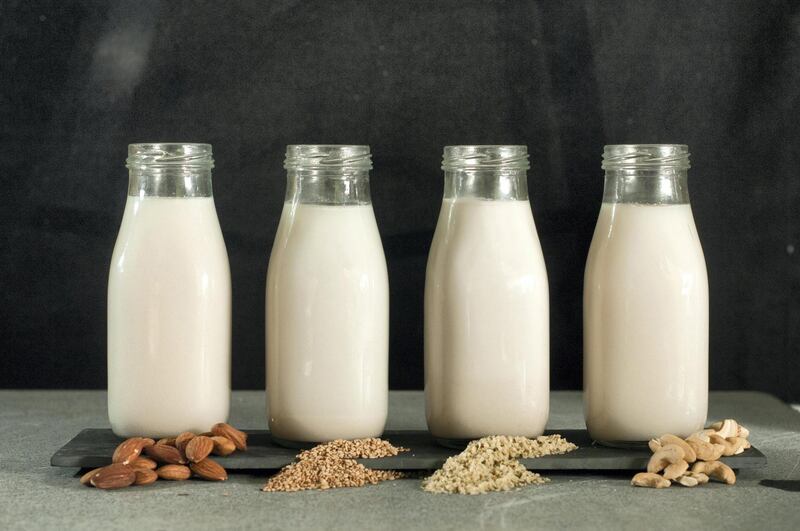When it comes to selecting milk, long gone are the days when you were limited to full-fat, semi-skimmed or abstentious skimmed.
Scan the aisles at any supermarket and you'll spot almond, soy, camel, oat, rice and cashew milks: in short, there's a whole world of dairy and non-dairy cow's milk alternatives out there.
Step into a coffee shop or café and further choice abounds. From nut-milk lattes to soy cappuccinos, golden milk and oat-based smoothies, eschewing cow’s milk is no longer just the preserve of those with dietary intolerances, it’s become a lifestyle choice.
As of last month, for an extra Dh3.25 Costa Coffee customers now have an additional option: those lattes, flat whites, mochas and more can all be made with coconut milk.

“We’ve seen a gradual shift to more healthy choices among our customers; people are demanding more variety in their drinks and we felt coconut milk was the perfect answer for those who were looking for a dairy-free alternative to cow’s milk,” explains Shemaine Jones, the head of marketing at Costa Coffee UAE.
Jones says the company expects to see upwards of 10 per cent of customers switching to coconut milk-based coffee over the next few months, and that this new addition to the milk menu is a reflection of global trends – particularly veganism – as well as local interest.
The initial response has taken Costa by surprise; earlier on this week they took to social media to announce some stores had sold out of the milk entirely but stock would be replenished soon.
Homegrown milk brand Koita built its reputation on supplying customers in the GCC with organic Italian cow’s milk that is free from additives, artificial hormones and antibiotics, yet as marketing manager Ramsha Vahidy notes listening to consumer needs and acting upon them has always been instrumental to their success. Premium alternatives are in such demand that companies are tailoring their offerings to suit the masses.
Last year, Koita expanded its range to include a lactose-free cow's milk that quickly became one of their fastest growing lines, as well as their first non-dairy milk product, a soy milk made from organic soy beans.
"People were looking for a cleaner-tasting version of soy milk and they just couldn't find it here," says Vahidy. "Although we were focused on cow products, we don't believe in a
black-and-white solution when it comes to milk."
The soy milks used by them don't have wheat in them, and according to Vahidy, they are made from non-GMO Italian soy beans with customers likening it more to cow's milk than soy.
Milk options are even greater when dining (and drinking) out. Peruse the menu at healthy eateries such as Comptoir 102 in Dubai and alongside the salad bowls, buckwheat pancakes and chia seed puddings you'll find matcha green tea, smoothies, coffee shakes and golden (turmeric) milk all prepared with homemade almond milk, as well as hot chocolate made with coconut milk, cacao powder and maple syrup.
It's at Flow, the café and creative hub in Jumeirah Emirates Towers, that you'll find perhaps the most personalised milk experience in the region; customers can pour their own milk (almond, soy, rice, coconut, oat and cow's milks are all on offer) from funky-looking taps.

The intention with Flow was always to offer wholesome, nutritious food and drinks that cater to those following gluten-free, Paleo and vegan diets, and despite only opening its doors a year ago, manager Molly Howlett-Huggins says there has been a notable increase in interest and demand for unsweetened non-dairy milks, which now make up around 30 per cent of all coffee sales at her establishment.
Howlett-Huggins believes this is driven by a greater awareness of the benefits of plant-based products and of the impact dairy farming could have on the environment.
Ultimately, the milk we drink will continue to be dictated by personal preference and dietary needs, as well as the occasional nod to food trends and social media.
While increased choice is for the most part a good thing, before you forgo cow's milk entirely or pledge your allegiance to a new form of (non)-dairy, dietician Jordana Smith says clue yourself up.
"We need to be cautious choosing our milk alternatives and not just consider the taste, but investigate the health credentials too: some contain added sugar, others are not enriched with calcium or are high in fat. The 'best' option really does depend on the needs of the individual."
Breaking it down
Camel milk
It would be remiss to write about cow’s milk alternatives in the Middle East without tipping our hats to camel milk. There’s nothing new about this drink though. Camel milk has been prized in the region for centuries and delivers on the nutrition front, too; as well as being lactose-free, it contains calcium, vitamin B and C, potassium, zinc and iron. In terms of other benefits, the texture and appearance of camel milk isn’t affected by heat and it has a similar consistency to cow’s milk, which means that it works well as a substitute when cooking and baking. Although its slightly salty yet sweet flavour can take a bit of getting used to, keep on sipping.
Coconut milk
Made from the pressed flesh of the coconut, and not to be confused with the water within, coconut milk is creamy and tropical tasting. It’s vaguely sweet, slightly nutty flavour works well with coffee, adds a richness to smoothies and is an excellent dairy-free alternative for cooking and baking. This milk is vegan, free from lactose, contains loads of fibre, vitamin B, iron, selenium and magnesium, and is believed to help boost the immune system. The major caveat with coconut milk is the high fat content and calorie count, and for this reason, Smith recommends it is only consumed in moderation — think a coconut milk latte a week.
Rice milk
Widely regarded as the most hypoallergenic of the non-dairy milk alternatives, rice milk is low in fat and high in carbs, fibre and vitamin B. Commercial varieties are often fortified with calcium and vitamins D and A to make for a naturally occurring lack, but be aware that this often means added sugar too, so drinking rice milk exclusively isn’t advised. Texture-wise, it’s often likened to skimmed milk and has a distinctive sweet taste that tends to divide opinion and will impact the flavour of a dish if used for cooking. Current advice from the British NHS warns against giving rice milk to children under the age of 5 due to potentially
unsafe levels of arsenic, which if consumed early in life can lead to other health problems later in life.
________________
Read more:
You can now have a 'selfiecino' in Dubai
Camel milk is gaining international recognition: here are three recipes to try
My key ingredient ... coconut milk
________________
Soy or soya milk
Experts continue to debate the health benefits or otherwise of soy milk. The drink is lactose-free, low in saturated fat and is considered a good source of protein and fibre. There is also some evidence to suggest that soy can help to manage cholesterol levels. That said, it is highly processed, so many dieticians, warn that it can affect hormone levels – this means teenagers and women who are pregnant or breastfeeding should be cautious with their consumption. In its purest form, soy milk is made from just soy beans and water, yet many brands contain sweeteners and wheat containing flavourings.
Nut milk
Nut milks are widely available in supermarkets yet can easily be made at home: soak your nut in plenty of water for several hours, drain and discard the liquid, then blitz the nuts in a blender with fresh water. Although unsweetened nut milks contain significantly less sugar than rice or soy, it’s important to be aware they are not considered a good source of calcium. If you swap cow’s milk for nut milk (inset), you’ll need to supplement your calcium intake.
Oat milk
Thanks to its silky texture and malt-like flavour, oat milk works well in smoothies and porridge, or when added to coffee and poured over cereal or granola. The drink is known for its health benefits – it is cholesterol-free, contains high levels of vitamin A and has a low glycemic index, meaning that it doesn’t cause spikes in blood sugar levels. It’s worth making your own (soak oats in water overnight in a ratio of one part oats to two parts water, strain and use the liquid as your milk alternative), or look out for commercial varieties that are vitamin- and calcium-enriched, and have no added sugar.






